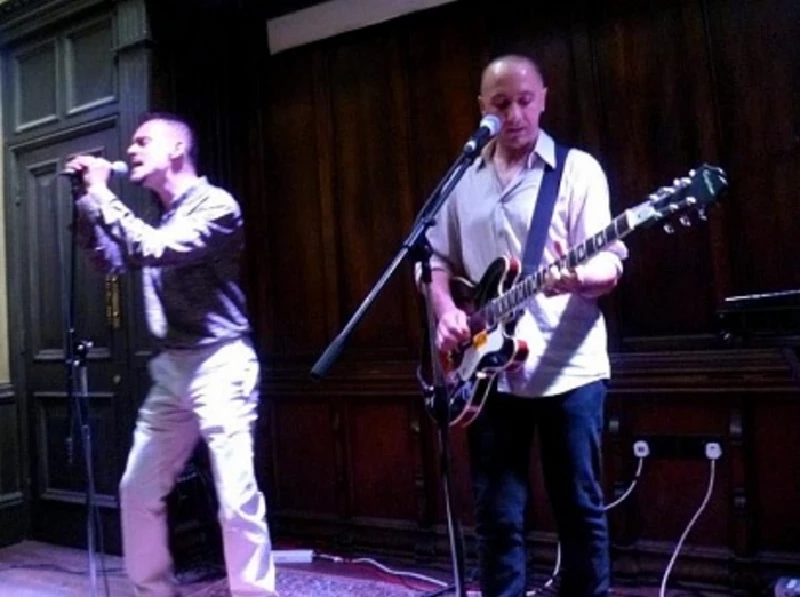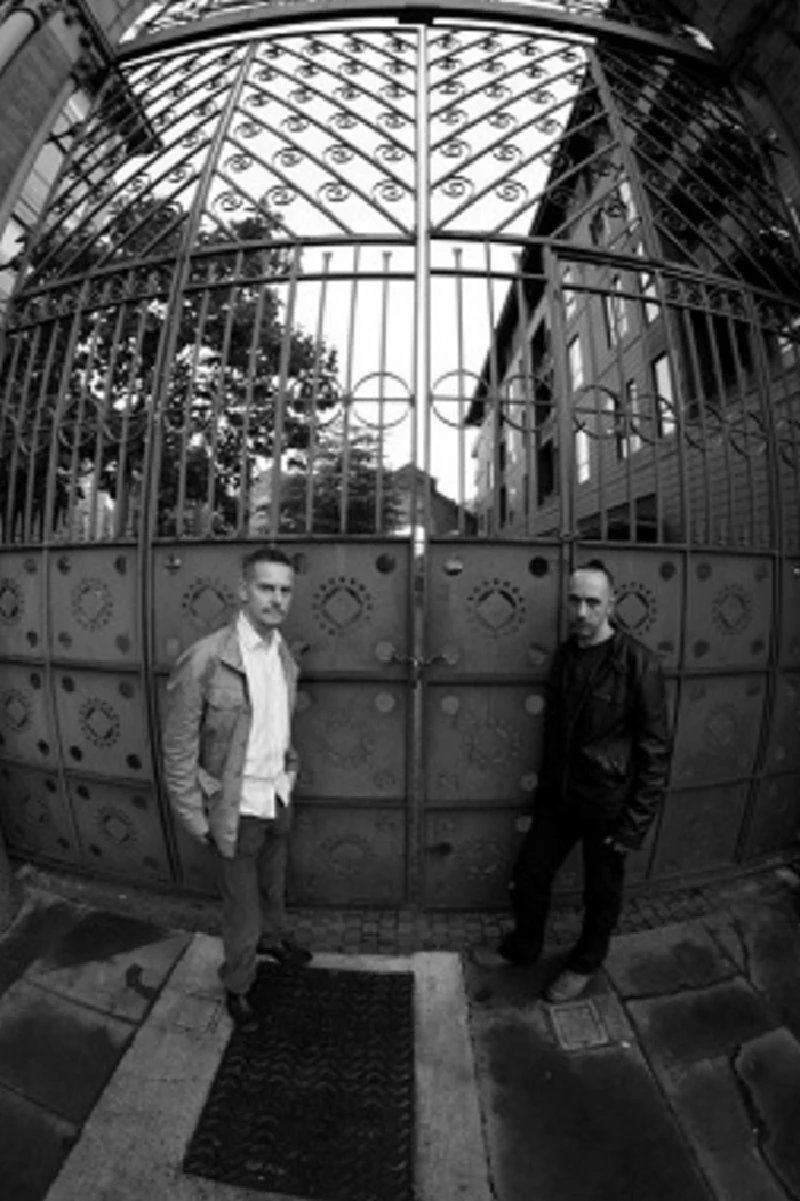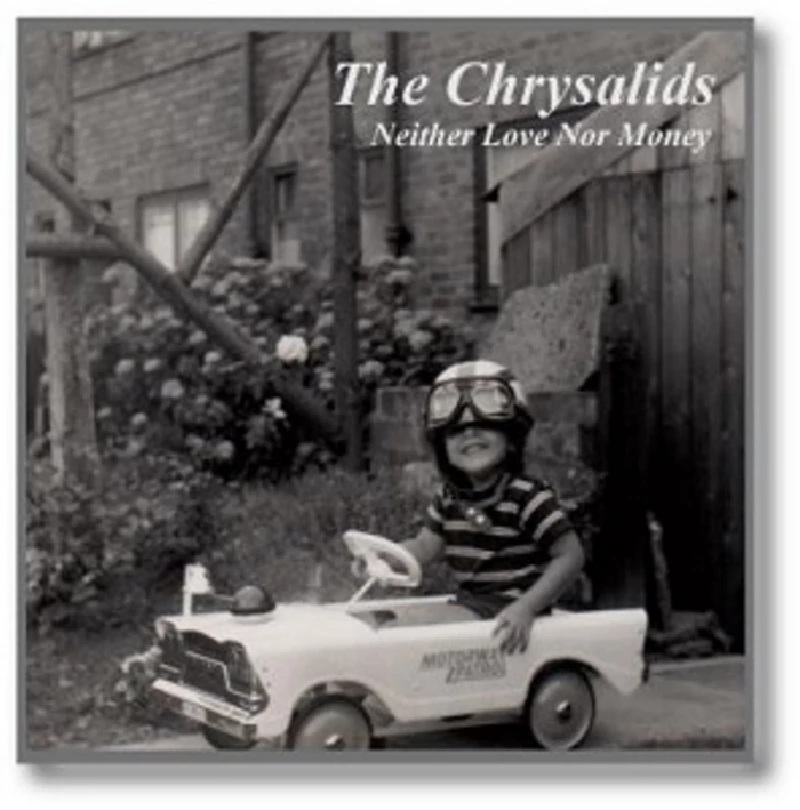Chrysalids - Interview
by Anthony Strutt
published: 7 / 10 / 2012

intro
Anthony Strutt discusses with John Wood both his 80's bands One Thousand Violins and the Chrysalids, the latter of whom have recently released their debut album, 'Neither Love Nor Money', over twenty years after they recorded most of its songs
John Wood was the original lead vocalist with One Thousand Violins, a 60’s-influenced indie pop band from Sheffield. One Thousand Violins released various singles in the mid-1980s, including ‘Halycon Days’, ‘Like One Thousand Violins’, ‘Locked Out of the Love-In’ and ‘If I Were a Bullet’ which were small hits on the indie charts. They also released an album, ‘Hey Man That’s Beautiful’, on the Immaculate label, in 1987, but Wood, however, left One Thousand Violins in 1988 to be replaced in the band’s last year before they finally split in 1989 by another singer Vince Keenan. After quitting the band, Wood formed a group, the Chrysalids, in Manchester with guitarist and bassist Yves Altana, and wrote some songs, as with the Violins he was just the vocalist. What a vocalist though! I can honestly say, having caught both the One Thousand Violins and also the Chrysalids at their one and only London gig, that with his emotive voice he is actually the best vocalist I have ever seen. The Chrysalids released just one track in their original lifetime, ‘My Heart is Where My Home Is’, on a compilation, ‘This is Manchester’, before splitting up in 1991. Now that track has been released on a fifteen track retrospective, ‘Neither Love Nor Money’, which includes several other songs recorded at the time and also four entirely new recordings, on Pronoia Records. They also recently played a launch show in Manchester I had often wondered what happened to John Wood since 1991, and was pleased to speak to him about One Thousand Violins and ‘Neither Love Nor Money’. Welcome back, John Wood. PB: How did you first become involved with One Thousand Violins? Where did the group get its name from? JW: The band was formed by Colin ( Gregory) and Dave ( Walmsley) as is well documented. They had previously been together as a duo, the Page Boys, who released one single, for Dan Treacy's Whaam! label, I think. I had contacted a friend of theirs through ‘Melody Maker’ who owned a recording studio in a barn in Shropshire and who wanted a singer for his demos. They heard what I'd recorded with him and phoned me up to invite me to sing on their planned single as One Thousand Violins. My voice seemed to work better with what they were doing and we took it from there. Colin and Dave named the band with reference to the Orange Juice song 'Consolation Prizes', whom they were both big fans of. One Thousand Violins was a continuation of their songwriting partnership, though Colin was the sole lyricist and, as I recall, mainstay of the writing. I was presented with the lyrics and the soundtrack and I would give my vocal interpretation, as far as the recordings went. PB: What were the early years of the group like? JW: For about a year after I joined we were a three piece using pre-recorded drums and bass on stage - and this was the line-up for the first John Peel session. There are some demos of the early songs, of course, but most were recorded in poor studios or Colin and Dave's porta studio - nothing presentable. I recall one or two songs from the three piece days which never saw the light of day because they fell from favour. Our first live event was at a mid-day under 16s disco at San Miguel's night club in Halifax. We played to an audience mostly comprised of twelve year old novice breakdancers and bodypoppers who did their thing to our songs, regardless. We had wanted to do something low key for the first live performance, I had never sang before to a live audience after all. I was thrilled by the fact that the billboard in the club showed that Nico had played their two weeks previously - presumably the bodypoppers were tucked up in their beds on that occasion! PB: The band initially released singles on Dreamworld in the UK and Constrictor in Germany. Were these good labels to be on? JW: There were problems with distribution on the Dreamworld singles i.e. they'd be out of print for a while after the initial pressings had sold out which couldn't have helped their chances of charting anywhere. A mini-album, ‘Locked Out of The Love-In’, was released on the German Constrictor label in 1987 featuring the E.P of the same name, a completely new and far superior version of ‘Halcyon Days’, as well as three other songs given faux titles to avoid publishing disputes; ‘The Candleman’, ‘Like One Thousand Violins’ and an early recording of ‘Poet’. The band eventually got involved with the Report label. There was a bigger recording budget and producers, Neil O'Connor ( brother of Hazel and formerly of the Flys) and Phil Tennant. The ‘If I Were A Bullet’ single, ‘Locked Out of the Love-In’ EP on Dreamworld, and the Janice Long and second John Peel session were the best recordings I did with the band. PB: Do you think that One Thousand Violins were unlucky in that they never met with the success they might have done? JW: I think that had One Thousand Violins had some daytime airplay then maybe we would have gained a bigger following. The songs still stand out for their melodic strength and could easily have appealed to a wider audience. We were on C86 but we certainly didn't relate to the shambling scene we became associated with. Even though we had to play on that circuit, we had a bigger sound, though perhaps lyrically the sentiment was with the fanzine kids. PB: Why did you decide to leave One Thousand Violins? JW: Although I enjoyed the performance side of being in the band and singing some great songs, I became frustrated with the creative set up and I was wanting to develop my own songwriting urge. Colin invited me to contribute some lyrics eventually but I wasn't quite ready to offer what suited their style and I was still finding my way, though I think that Dave just wanted to keep that side of things to him and Colin. Although I shared Colin and Dave's love of 60’s music I had a much broader musical taste and would have found the jingle- jangle and subsequent 60’s pastiching a bit too restrictive. I took the decision to leave and met with Yves Altana with whom I formed the Chrysalids , again through ‘Melody Maker’ ads. I told Colin and Dave that I intended to leave and, although not contractually obligated, worked out my notice - albeit heavy heartedly. I still have some of those songs swirling around my head to this day. PB: What are your favourite One Thousand Violins songs? JW: My favourite One Thousand Violins songs: ‘If I were a Bullet’, ‘Poet’, ‘Nigh On Forty Years to Go’, ‘I Think It's Time I Broke Down’, ‘No-one Was Saving The World’. PB: How quickly after leaving One Thousand Violins did you and Yves move to Manchester? Why did you decide to call yourself the Chrysalids? JW: Yves and I moved up to Manchester within a few weeks of the last One Thousand Violins concert I played at Keele University in December 87 - a kind of Xmas bop. We began to work on ideas that Yves and myself had and started to forge them into proper songs. We were writing on our own from the beginning until the end of the band – though’ Spoil the Child’ was mainly Aki's tune and it was one of the last songs we put together. Yves had always hoped that we would find a guitarist and drummer to co-write with but that never really happened, and eventually Yves had to move away from bass and take up guitar playing proper just so that we could develop the arrangements. A lot of time was spent inactive waiting for the 'right' guitarist and drummer! After a couple of years of struggling with line- ups we got John Lever ( former drummer of the Chameleons) in and Aki on bass ( who, after we folded, joined Molly Half Head with one of our former drummers Andy Pickering). By that time we had become an impressive live band. I struggled to come up with a name all band members liked but eventually the Chrysalids was agreed upon. The name worked for me because I was in a bit of a nascent state emotionally and a lot of the songs refelect that. Although we evolved to become accomplished musically the band name proved to be prophetic, as we never quite found our wings in terms of becoming well known. PB: Why did you decide to move to Manchester? How did ‘My Heart is Where My Home Is’ end up on the ‘This is Manchester’ compilation? JW: Yves and I located to Manchester because we figured that the size of the place and its musical history would make it easy to find musicians on our wavelength. Little did we know that within about eighteen months everything in the city would go 'baggy'. Ironically we ended up rehearsing right next door to the Stone Roses who were well established locally and just about to go mega - they always seemed to be running through ‘I Wanna Be Adored!’ We played the local circuit, got a few support slots to minor league names such as Furniture, Eat and Frazier Chorus, picked up local radio play and even got some passing interest from Sony and Warner who were obviously by this time going ga-ga for almost anything current and in Madchester. There was absolutely no connection on our part with Madchester, which was all that journalists and record labels - major and independent - seemed to be interested in. However, Tony Davidson who had 'discovered' Mick Hucknall, and had formed the punk label TJM Records, picked up on ‘My Heart is Where My Home Is’ and offered us £500 for the publishing, which we declined. We licensed the recording to him to put on his 'This Is Manchester' compilation on Castle Records. It was a disparate collection of bands that were all outside of the Madchester bubble - thus sealing its fate. A review in NME's’ Vox’ magazine( Nov 1990) commented that the album was “crap” but that; 'there are some individual successes: “The Chrysalids' grand textures and sweeping songcrafting is suspiciously reminiscent of the excellent 1000 Violins ( RIP).” I swear I do not know who this journo was let alone slip anything in his drink. PB: How did you and Yves put the songs together? Was there a particular formula? JW: We had worked on a few songs together whilst I was in One Thousand Violins - the first song we wrote was ‘Before I Stop Let Me Start’, which is the last song on the album. It was exciting for me to be able to put my words to someone else's music and come up with an impressive song. Although I had attempted to write songs on my own before I met Yves, I only play some basic guitar so I'm pretty limited for picking up an instrument and writing a well composed song. Some of those ideas I had done on my own were worked into something better together. An example of how Yves and I put songs together is ‘Shrine’, which was originally a verse and chorus vocal melody with some basic chords I'd had but Yves added all the instrumentation and wrote parts for the drums, brass and guitar riffs. Most of the Chrysalids songs, however, evolve out of instrumentals that Yves puts together - they often sound great as instrumentals on their own, such as ‘Tell My Story’ and’ Before I Stop’. Sometimes I identify passages of these instrumentals I want for a chorus, verse or an intro and we shape a song structure by adding my words and vocals. Sometimes Yves presents something which is structured more like a wordless pop song such as ‘Too Lucky to Listen’. PB: How did you feel returning to these songs after all this time for the ‘Neither Love Nor Money’ compilation? Do you think they stand up today and did you have to re-record many of them for the compilation? JW: Being asked by Pronoia to put together what is effectively a complilation of the Chrysalids repertoire ( two songs, ‘End of the Pier Show’ and ‘Last of the Centurions’ are download only) forced us to go back and listen. We were surprised at how much we still liked the songs and, frankly, how fresh and undated they sound - particularly when compared to some of our 'baggy' contemporaries of the time. Again ironically the album was mastered a couple of weeks before the Stone Roses announced their comeback concerts. We had to re-record five songs for the album as the original recordings weren't of presentable standard - only ‘Shrine’ was reworked. I think that a few songs could have been hits at the time had we been given the opportunity to record them to their full potential and had received some national exposure. But there was no management - though the Mock Turtles' ex-manager was showing an interest just before the Chrysalids ended - and I had not made any industry connections during my time as the shy and retiring boy singer with One Thousand Violins who would just hide in the back of the van with a packet of biscuits rather than 'network', or even party! PB: Do you have any plans to go back to doing this even part time? Are you planning to play any more gigs to promote the compilation? JW: We're on a small label with no promotional budget and no pluggers so our expectations are proportionate. There has been a little regional press so far but no airplay as yet - 6Music was our best hope but a retrospective album of an obscure band puts it at a great disadvantage. At least the internet and YouTube will allow the songs to have a life now and the CD has distribution and is available directly from Pronoia. Should there be any significant interest then it'd be worthwhile to go out and play live again - and I'm talking of having an audience here, rather than money! PB: Will you be releasing any more Chrysalids material, and have you been involved in any other projects since the Chrysalids ended first time around? JW: Yves has been involved in a number of other bands ( Wonky Alice, Mark Burgess and played with The Bardots and I Am Kloot) since and is a freelance producer now. I co-wrote a whole set of rather good songs about 6 years ago after someone begged me to but they will never see the light of day as the other guy just threw in the towel overnight - twice!. We have a few songs written post Chrysalids and maybe we could do more if we thought anyone wanted us to. PB: Thank you.
Picture Gallery:-


live reviews |
|
The Castle, Manchester, 5/8/2012 |

|
| At The Castle in Manchester, Dizie Ernill watches ill-fated indie guitar duo the Chrysalids play an emotive and intimate gig to launch their debut album, 'Neither Love Nor Money', which has finally come out nearly twenty five years after they first formed |
favourite album |
|
Neither Love Nor Money (2012) |

|
| Anthony Strutt examines long lost Manchester band the Chrysalids' debut album, which, largely consisting of tracks recorded over twenty years ago, has only just been released now |
| Neither Love or Money (2012) |
most viewed articles
current edition
John McKay - InterviewRobert Forster - Interview
Cathode Ray - Interview
Spear Of Destiny - Interview
Fiona Hutchings - Interview
When Rivers Meet - Waterfront, Norwich, 29/5/2025
Carl Ewens - David Bowie 1964 to 1982 On Track: Every Album, Every Song
Chris Wade - Interview
Brian Wilson - Ten Songs That Made Me Love...
Shrag - Huw Stephens Session 08.12.10 and Marc Riley Session 21.03.12
previous editions
Heavenly - P.U.N.K. Girl EPBoomtown Rats - Ten Songs That Made Me Love....
Allan Clarke - Interview
Manic Street Preachers - (Gig of a Lifetime) Millennium Stadium, Cardiff, December 1999
Oasis - Oasis, Earl's Court, London, 1995
Barrie Barlow - Interview
Dwina Gibb - Interview
Beautiful South - Ten Songs That Made Me Love...
Pixies - Ten Songs That Made Me Love...
Sound - Interview with Bi Marshall Part 1
most viewed reviews
current edition
Peter Doolan - I Am a Tree Rooted to the Spot and a Snake Moves Around Me,in a CircleVinny Peculiar - Things Too Long Left Unsaid
Garbage - Let All That We Imagine Be The Light
Vultures - Liz Kershaw Session 16.06.88
John McKay - Sixes and #Sevens
Little Simz - Lotus
HAIM - I Quit
Morcheeba - Escape The Chaos
Eddie Chacon - Lay Low
Billy Nomates - Metalhorse
Pennyblackmusic Regular Contributors
Adrian Janes
Amanda J. Window
Andrew Twambley
Anthony Dhanendran
Benjamin Howarth
Cila Warncke
Daniel Cressey
Darren Aston
Dastardly
Dave Goodwin
Denzil Watson
Dominic B. Simpson
Eoghan Lyng
Fiona Hutchings
Harry Sherriff
Helen Tipping
Jamie Rowland
John Clarkson
Julie Cruickshank
Kimberly Bright
Lisa Torem
Maarten Schiethart